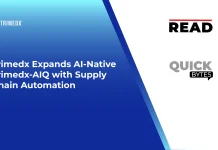VisionNav Robotics, a global manufacturer of driverless industrial vehicles, announced a C+ round of more than US$80m led by Meituan (China’s leading e-commerce platform for services) and 5Y Capital, making VisionNav the company with the greatest number of funding rounds and the biggest single funding in the field of driverless industrial vehicles globally.
VisionNav Robotics stressed that this round of funding will be mainly used to:
Research new technology and innovative forms of product development;
Optimize product performance, focusing on product stability and standardization;
Promote large-scale implementation and localized delivery for global customers.
Founded in 2016, VisionNav Robotics is now a leading company of driverless industrial vehicles. It is committed to applying artificial intelligence (AI), environmental perception, deep learning, servo control, and other core technologies to industrial vehicles, providing autonomous vehicles and flexible unmanned solutions for intralogistics in factories and warehouses. At present, VisionNav Robotics has developed nine series of driverless industrial vehicles and robot control systems.
Since the last round of funding, VisionNav Robotics has accelerated its globalization and set up marketing centers in more than 30 countries and regions. The Company has successfully delivered more than 350 projects, more than 1,500 autonomous forklifts and unmanned tractors, covering auto parts, tires, petrochemicals, tobacco, food, pharmaceuticals, 3C electronics manufacturing, e-commerce logistics, third-party logistics, textiles, printing, and papermaking among many others. Over 70% are projects with complex scenarios and rigid demands, and cooperation has also been established with in excess of fifty Fortune 500 companies.
Low efficiency, a difficult labor recruitment environment, and a lack of digitalization have been the main pain points that have plagued the intralogistics of enterprises for a long time. Driverless industrial vehicles provide a feasible solution to these pain points, thus forming a potential market with huge growth. According to World Industrial Trucks Statistics (WITS) data, global forklift shipments volume reached 1.58 million units in 2020 and 2.34 million units in 2021, an increase of 42.93% over last year. Fortune Business Insights predicts that the CAGR of global forklift shipments from 2021 to 2028 is about 4.3%. At present, the electrification ratio of global forklifts has reached 63% (WITS, 2020), and it is expected that 20% will be autonomous in 2028, with a market size of nearly 100 billion.
VisionNav Robotics places great emphasis on the development and application of driverless industrial vehicles. Based on industry-leading robot perception, control, positioning, and scheduling technology, its business has covered all scenarios of intralogistics, making breakthroughs such as 9.4-meter high rack storage, 2-meter narrow aisle access, unmanned loading and unloading, multi-layer mobile material frame stacking and other complex scenario applications, precipitated a large number of learning scenarios, established industry feasibility standards, and formed absolute technical barriers.
Also Read: 5 Innovations in Autonomous Farming Transforming Agriculture
In terms of its business model, VisionNav Robotics has maintained close cooperation with key players throughout the business chain, including leading international suppliers and end customers. Cost advantage has been verified to stand out in the market. Li Luyang, CEO of VisionNav Robotics, said that under the backdrop of an uncertain international situation and the ongoing pandemic, the robot industry has ushered in a year of “challenge” and is moving towards a stage of large-scale and standardized delivery. VisionNav Robotics has gradually shaped the ecology around unmanned intralogistics, the integration of the supply chain has been improved, and the operational capability of the whole chain has also built a competitive barrier for the company.
According to Li, sales amount witnessed 10-fold growth between 2019 to 2021. Compared to 2021, it is estimated to surge by 300% in 2022, with average order amount increasing by 350% and the amount of customer re-purchase order by 300%. With the entry of new markets and the large-scale delivery in advantageous scenarios, business scale is promising to increase 5-fold this year.






